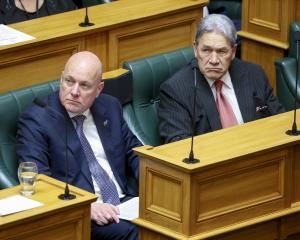

If I had been on top of my game, I might have asked if King Charles was dead.
Well, it was 5.40am and I had been rudely awoken.
It was not police shining lights into my bedroom as they did in Jacinda Ardern’s when the Queen died, but another shining light, my 8-year-old granddaughter, hovering at the bedside.
"Is it actually daytime?" I asked, attempting to prise my eyes open.
She was sure it was. The dear wee birdies were singing and, she reminded me, I had said we had to get an early start to take my car to the garage.
She did not grasp that 7.30am, when we would need to depart, was a long way away and that because we would be breakfasting in town there was no rush. However, I was not up to an impromptu maths lesson. I could not convince her further rest was needed.
In the afternoon she kept me awake showing off her swimming skills at our nearby beach, having fun with a slightly older local girl she had just met.
As I told that girl’s mother, it was great to see, given four years earlier there I had to step in after she was confronted with the petty unkindness of strangers — older girls keen to throw mud and seaweed at her as a "prize".
Such events have a habit of sticking, even if in this case the mud did not get a chance to.
Later, I realised the time of my recollections would have coincided with the announcement from Jacinda Ardern that she was resigning as prime minister.
Ms Ardern has played down any role vitriol towards her may have had in her decision to step aside. As one commentator suggested, admitting it got to her would be letting the haters win.
But it is hard to believe she could be oblivious to the increase in nastiness and threats serious enough to concern police. Even on her recent holiday there was a report of her being abused at a restaurant.
Before her announcement, there were already fears about the possible risks to her and others in the election campaign. Worries about the level of vileness out there meant the cancellation of Labour’s traditional Waitangi Day barbecue, where she and other politicians would cook up a storm for the public.
A proliferation of websites spouting ill-informed bile, poorly regulated social media and easy email access to politicians have given too many opportunities to the echo chamber of the sad, the bad and the mad.
This is not confined to the hounding of Ms Ardern. Anyone in public office, local or national, is considered fair game by unreasonable people, and it is often worse for women.
In the aftermath of her resignation, it has been disappointing to see the graceless response and reluctance to acknowledge her dedicated service by some of the Government’s detractors.
The job of prime minister is no walk in the park. If you do walk in the park your footsteps will be dogged by the protection squad. Your ability to lead the sort of family life most take for granted is curtailed. You are rarely off duty and expected to be able to give an instant coherent opinion on almost anything.
There might be overseas travel, but despite any jet lag, you must meet and greet and sound intelligent, and not look like an unmade bed.
Is it time to examine whether expectations of whoever is prime minister have got out of hand and if there is a saner way to organise this job?
It was telling to read in a pre-Covid-19 interview with MsArdern in the I-know-this-to-be-true series on leaders (produced in collaboration with the Nelson Mandela Foundation), she said the biggest lesson she had learned as a leader was "that you won’t necessarily get tougher".
Asked if there were moments when she just felt hurt, she said she did every day, but she did not hold on to grievance.
Judgement was swift and constant and could come from all angles in the social media age.
"Know when you don’t feel tough enough to take it from every angle, from all sides, and just check out of some of those spaces if you need to."
Ms Ardern made the observation the world did not need a "whole lot of massively thick-skinned politicians; they do need people who care".
If we agree with that, and we care about attracting good people to politics, we must all learn to air differences without resorting to abuse or violence and be tough enough to call it out when we see it.
- Elspeth McLean is a Dunedin writer.












